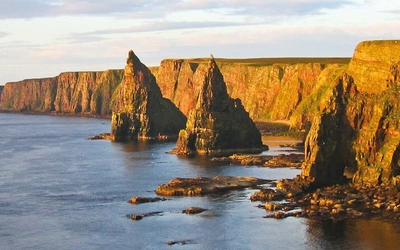
Article

Backpacking – carrying all your equipment with you on a multi-day route. Overnight you can camp, bivvy or maybe stay in a bothy. Many trails and mountain routes can be backpacked. Here we have pulled out a selection, including the challenging Cape Wrath Trail.
22 Books Available
Scotland is ideal for backpacking. With hundreds of square miles of wilderness it's possible to wild camp, or to stay in a series of bothies. While the Cape Wrath Trail is probably the most challenging backpacking route, covering 230 miles across pathless mountain wilderness, there are other routes that are also best tackled by backpacking. These include the Skye Trail from Rubha Hunish in the north to Broadford in the south of the Island and the Hebridean Way, covering 154 miles through the outer Hebrides. It's always a great idea to give yourself more freedom and make up your own backpacking routes, so plan around a series of overnight Bothy stays, or take a bivvy sack with you and really experience the solitude and peace of the hills. If you're a runner, Fastpacking can be a fantastic way to cover more ground and travel ultra-light.
The routes in Great Mountain Days in Scotland, (many of which can easily turn out to be two or three days long!) can provide inspiration and good training to see how you get on with backpacking and carrying more on your back.
Moving further south, although the Southern Upland Way has options for B&B accommodation along most of the route, there are some sections where this is not possible without staying two days in one place, so backpacking is easily the better option. It's one of Scotland's designated 'Great Trails', so the 215 mile (347km) route is well signed and maintained as it traces its way from coast to coast through Galloway and the Scottish Borders.
Any long-distance trail can be backpacked, although some may pass through more densely populated regions, making it more difficult to find suitable places to camp. The Cumbria Way has a good selection of campsites along the length of the route, and the Coast to Coast would also be a good option for backpacking, providing more freedom to pick places to stop, especially when there is pressure on accommodation in the main season.
12 Articles Available